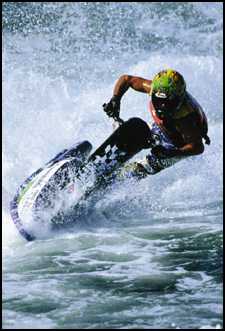
 Surf Home
Surf Home
The situation with tow in surfing is an interesting one. The sport's originators are trying to keep it "legal," but the current trend across the nation is to ban Personal Water Craft altogether.
In Hawai'i, the existing federal and state laws make it illegal to operate personal water craft (PWC) within 200 feet of any swimmer, diver, surfer or windsurfer. PWC are also supposed to comply with a No Wake Zone within 300 feet from shore. They are supposed to be launched from public boat ramps, not public beaches, unless you are the owner of beach front property. Further, there are only certain legal areas to operate a PWC. Most of the outer reefs, especially on O'ahu's North Shore, fall in to its "Ocean Recreation Management Area." So technically, at some point most tow in surfers are breaking the law.
In an attempt to legitimize the sport and decrease the potential for "loose cannons and hell raisers," Brian Keaulana, Mike Waltze and Dave Kalama have teamed up with Ken Bradshaw to put together the World Tow Surfing Association. Members of the WTSA include Pete Cabrinha, Brett Lickle, Mark Angulo, Rush Randall, Titus Kinimaka, Gerry and Victor Lopez, Robbie Naish, Charlie Walker, and support is still growing. Bradshaw has submitted a permit application to allow WTSA members (who are certified in CPR and Lifesaving) access to waves like Avalanche, Himalayas and Phantoms.
While there are a few people who feel the sport does not need an official governing body, WTSA Acting Director Ken Bradshaw says, "It's a tricky situation, and we don't want any bad press. Basically, all we're trying to do is to cooperate with the state to help solve problems before something drastic happens."
In any case, when the waves come up, tow surfing happens. If the WTSA's permit is accepted, members would file float plans, adhere to all laws, and help lifeguards. If their permit is denied, then it's like the old saying, "When fun is outlawed, only outlaws have fun."

 Surf Home
Surf Home